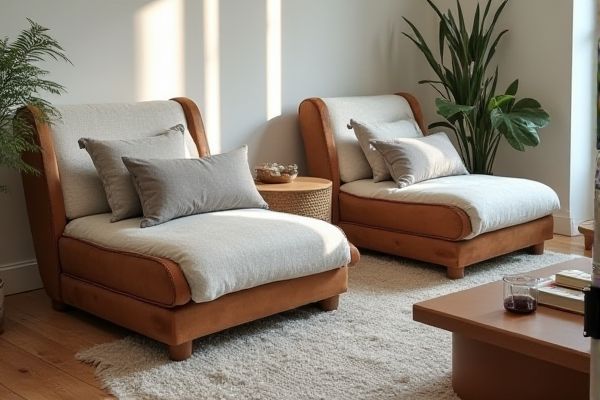
A backrest pillow offers full lumbar and upper back support, ideal for extended periods of sitting, while a reading wedge provides a firm incline that helps maintain proper posture and reduces neck strain during reading or lounging. Discover which option best suits Your comfort needs by reading the rest of this article.
Table of Comparison
| Feature | Backrest Pillow | Reading Wedge |
|---|---|---|
| Primary Use | Supports upper back and shoulders when sitting up | Elevates upper body for reading or resting in bed |
| Design | U-shaped or square with armrests | Triangular wedge shape |
| Support Level | Medium to firm for posture correction | Firm incline for head and torso elevation |
| Common Materials | Memory foam, polyester fiberfill | High-density foam |
| Portability | Moderate; heavier and bulkier | Lightweight and easier to carry |
| Best For | Reading, watching TV, laptop use in bed | Reading, acid reflux relief, post-surgery support |
| Adjustability | Limited; fixed shape | Often adjustable angles available |
| Price Range | $20 - $60 | $15 - $50 |
Introduction: Understanding Backrest Pillows and Reading Wedges
Backrest pillows provide ergonomic support for your spine, enhancing comfort while sitting upright for extended periods. Reading wedges feature a sloped design that elevates your torso and head, promoting better posture and reducing neck strain during reading or lounging. Choosing between a backrest pillow and a reading wedge depends on your specific comfort needs and the type of support your body requires.
Design and Structure Comparison
Backrest pillows feature a broad, cushioned base with a taller, supportive back designed to align the spine and provide lumbar support, promoting upright posture while seated. Reading wedges have a more compact, triangular structure with a gentle incline, ideal for elevating the upper body and neck to reduce strain during reading or lounging. The backrest pillow's larger surface area offers more extensive back coverage, whereas the reading wedge emphasizes ergonomic elevation and portability.
Comfort and Ergonomic Support
Backrest pillows provide versatile support with thick cushioning that molds to the spine, promoting correct posture during extended sitting sessions. Reading wedges offer firmer, angled support that elevates the upper body to reduce neck and shoulder strain, ideal for focused reading or laptop use. Both options enhance comfort by alleviating pressure points, but backrest pillows excel in customizable lumbar support while reading wedges prioritize consistent ergonomic elevation.
Ideal Use Cases: Who Benefits Most?
Backrest pillows provide versatile support for sitting upright in bed or on a couch, making them ideal for individuals recovering from surgery or those who spend extended periods sitting. Reading wedges, with their firm incline and compact size, are tailored for readers and students who need focused lumbar and neck support during study sessions. Ergonomically, backrest pillows suit people with general comfort needs, while reading wedges benefit those seeking precise posture correction during concentrated activities.
Material and Durability Differences
Backrest pillows typically feature memory foam or polyester filling with a fabric cover like cotton or velour, providing firm support and lasting durability suitable for prolonged use. Reading wedges often use high-density foam with a smooth, wipeable cover, prioritizing lightweight convenience but potentially less longevity under heavy use. Your choice depends on whether you prefer the plush resilience of backrest pillows or the compact practicality of reading wedges for material and durability needs.
Portability and Storage Options
Backrest pillows offer a bulkier design that can provide firm support but may be less portable and require more storage space. Reading wedges are generally lighter and more compact, making them easier to carry and store in small areas like drawers or under beds. Your choice depends on whether portability or stability is more important for your reading comfort.
Maintenance and Cleaning Requirements
Backrest pillows typically feature removable covers made from machine-washable fabrics, making their maintenance straightforward and convenient. Reading wedges often have a fixed cover that requires spot cleaning, which can make deep cleaning more challenging over time. Choosing the right option depends on Your preference for ease of upkeep and the level of comfort retention after repeated washes.
Price Range and Value for Money
Backrest pillows typically range from $20 to $60, offering affordable support with varying levels of firmness and size, making them a cost-effective choice for casual users seeking comfort during reading or relaxation. Reading wedges usually cost between $30 and $80, often featuring denser foam and ergonomic designs that provide better spinal alignment, delivering enhanced value for users needing more structured support. Evaluating individual needs against price points helps determine the best investment, with reading wedges generally providing superior durability and posture benefits for a slightly higher cost.
Customer Reviews and Satisfaction
Customer reviews for backrest pillows frequently highlight their superior lumbar support and overall comfort, making them ideal for extended sitting periods. Reading wedges receive high satisfaction ratings for their ergonomic incline that promotes better posture and reduces neck strain during reading sessions. Both products consistently earn praise for enhancing relaxation, but user preferences tend to favor backrest pillows for versatility and wedges for targeted neck and shoulder support.
Choosing the Right Pillow for Your Needs
Choosing the right pillow for your needs depends on your preferred support and comfort level. A backrest pillow provides firm lumbar support and helps maintain proper posture while sitting upright, ideal for long reading sessions or desk work. If you seek angled support to prop yourself comfortably in bed, a reading wedge pillow offers gentle incline, promoting spinal alignment and reducing strain on your neck and shoulders.
 homyna.com
homyna.com